Peetal or pital is the commonly used term for brass across the Indian subcontinent. Peetal utensils have been in use in India since ancient times. It is believed that brass utensils in India have been used for centuries. Vedic texts refer to enough traditions and events that employed the use of brass utensils and other objects.
However, when trying to trace the origin of the widespread use of the element, we find that brass was introduced in the country during the rule of the Mughals. Initially, pital or brass was used widely in the making of artillery by the army. Later it found its use increasing manifold both in homes like brass utensils and elsewhere for commercial and other purposes.
Pital Utensils And Their Importance In Indian Culture
In contemporary India the most skilled craftsmen who make pital utensils reside in Punjab, largely. The “Thatheras” are famous for their craftsmanship that gives shape to brilliant brass, copper and other metal utensils, which are supposed to reap many health benefits to the consumers.
Brass utensils are used extensively in India. Whether it is in common household usage or in some auspicious events or traditional pujas, brass items find a special place reserved every single time.
Brass Utensils Benefits: What are Pital Utensils?
Composition Of Pital Utensils
Pital utensils, which find great use in Indian households are made from brass. An alloy made from copper and zinc, brass is famous in many countries. Though the typical composition of brass consists of approximately 70-90% copper and 10-30% zinc, the precise composition of various manufactures may vary depending on their standards.
Though pure pital utensils are those that are made from an alloy of zinc and copper alone, at times the brass products may be formed with other metals as well. Different elements, such as lead, tin, or iron, can also be added to the alloy at time, to achieve specific properties desired at different instances.
Brief History Of Pital Utensils In India
The use of brass has been traced thousands of years back in India, dating back to the Indus Valley civilization. Though because of the many benefits of brass, the usage of brass utensils gained prominence during the Mughal era, when artisans began creating intricate designs on brassware.
In the beginning, pital utensils were particularly popular in the Northern region of India. The different utensils and crockery made of brass were used for cooking, serving food, and storing water. Later, brass utensils became more popular for use across the country.
Different Types Of Pital Utensils Used In Indian Households
Pital utensils come in a variety of shapes and sizes and are used for a range of purposes in Indian households. Owing to the rich and diverse taste palette of people across India, numerous utensils have become popular and important for daily cooking in households. Some common types of pital utensils used in the nation include:
- Kadhai: A deep, wok-like pan used for frying and sautéing veggies, making pulses and other regular food items is referred to as the kadhai. These days kadhai is often designed to have a dual purpose of cooking as well as serving.
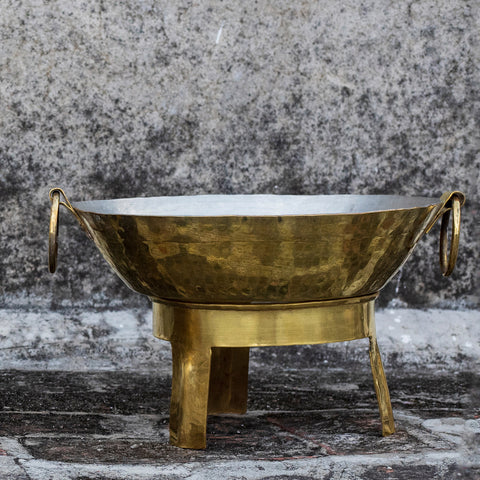
- Handi: A wide, shallow pot used for cooking stews and curries is called handi. Pital utensils like Handi are popular because they are believed to infuse better flavours in gosht-meat dishes, making them even tastier.
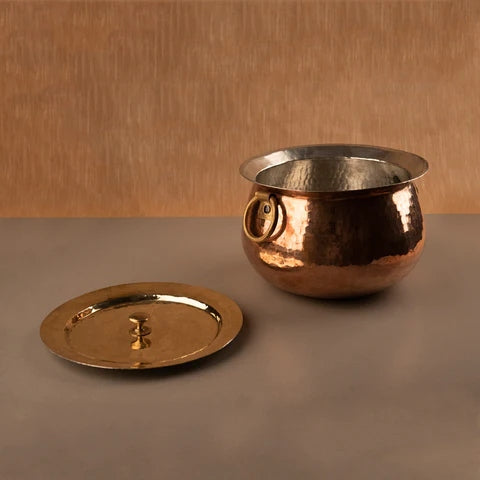
- Parat: A large, flat dish used for kneading dough or mixing ingredients. Brass parats also find purpose during religious and traditional events.
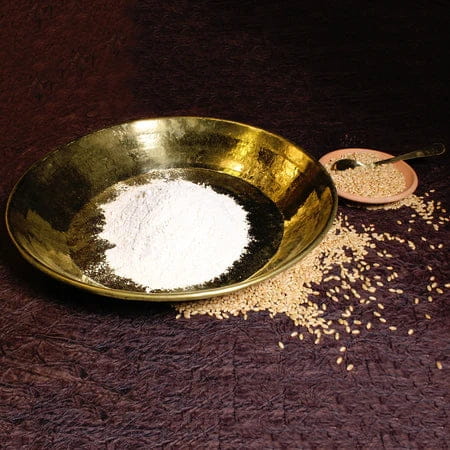
- Lota: A small, jug-like container used for storing water for drinking while eating. Brass utensils' benefits for health make it a popular choice for serving water.
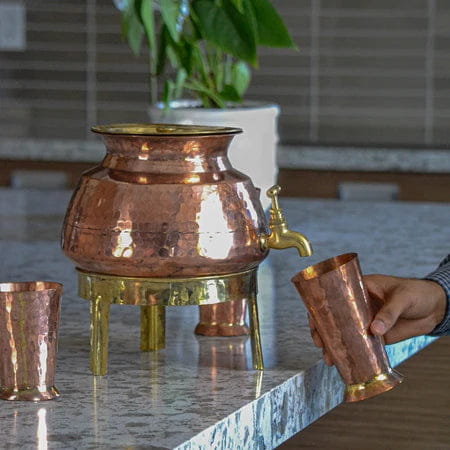
- Thali: A round, metal plate used for serving food. It is usually employed when having bigger meals of the day like lunch and dinner.
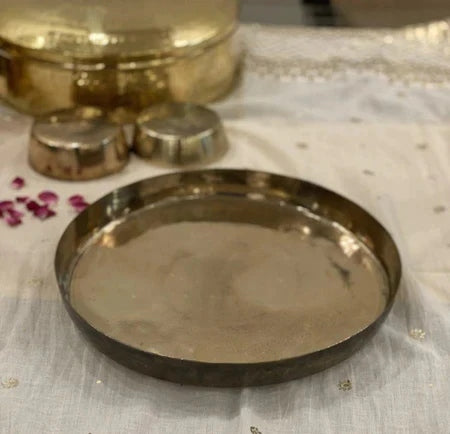
11 Health Benefits Of Using Pital Utensils
Utensils made from brass, or pital as referred to in India, have been known to endow food with many health benefits. Brass cookware is famous for the many health benefits it reaps for the people using it regularly.
1. Boosts Immunity: Pital utensils have antimicrobial properties, which help to boost immunity and prevent infections in people.
2. Good for Digestion: It is believed that Brass utensils promote the secretion of digestive enzymes, which in turn help in better digestion of food.
3. Maintains Body Temperature: Brass alloy can help maintain body temperature, as it has excellent heat retention properties. This feature makes brass cookware suitable for everyday.
4. Helps in Detoxification: Pital utensils can help in detoxification, as they help to remove toxins from the body.
5. Anti-inflammatory: Brass has anti-inflammatory properties, which can help to reduce inflammation in the body.
6. Regulates Thyroid Glands: Drinking water from Pital utensils can help to regulate the thyroid glands, which play a vital role in metabolism.
7. Boosts Haemoglobin: Brass utensils can also help to boost haemoglobin levels, which can help to prevent anaemia. These traditional utensils are a good source of copper, which is essential for the production of red blood cells in our bodies.
8. Prevents Anaemia: As we’ve just read, the usage of brass utensils will impart necessary properties to our food for increasing the haemoglobin levels significantly. Thus, as a direct result, the brass and copper utensil benefits include fighting and preventing anaemia in individuals.
9. Enhances Brain Function: Pital utensils can enhance brain function, as they are a good source of zinc, which is essential for cognitive function.
10. Reduces Stress: Drinking water from Pital utensils can help to reduce stress, as it has a calming effect on the mind and body.
11. Improves Skin Health: Brass utensils can help to improve skin health, as they are a good source of copper, which is essential for the production of collagen.
Using such traditional cookware like brass, silver, copper has numerous health benefits for people, which cannot be overlooked in the long term. Therefore, if you wish to live intentionally and use our ancient brass utensils among others to enhance your health and add nutrients to your diet naturally, this easy guide will prove beneficial for you.
Spiritual Significance of Pital Utensils
In Indian culture, Pital utensils hold spiritual significance and are often used in religious ceremonies and rituals. It is believed that using utensils or other objects made of brass during prayer ceremonies bring positive energy and help make the prayer service more effectively.
Thus, it is obvious that in addition to the practical benefits, or health benefits of pital the alloy is also particularly well-known for its spiritual significance in Indian culture.
How Are Pital utensils Used In Religious Ceremonies And Rituals
Utensils made from pital are often used in religious ceremonies and rituals in India. They are considered auspicious and are used to offer food and water to deities. Pital utensils are also used in traditional Indian weddings to serve food to guests.
Symbolism Of Pital Utensils In Indian Culture
Pital utensils hold a significant place in Indian culture and are often seen as a symbol of wealth and prosperity. The association of brass with purity, luck and positivity has been long established in Indian culture.
Many archaic texts of eminence suggest that alloys like pital along with some other metals such as copper, silver and gold are sacred and have great spiritual value.
How To Care for Pital Utensils
To care for Pital utensils, they should be washed with a mild detergent and dried thoroughly. They should be polished regularly to maintain their shine. To remove tarnishes or stains, a mixture of lemon juice and salt can be used.
Our Verdict On Brass Cookware
Brass cookware, also known as pital utensils in Hindi, has been used in Indian households for centuries due to its numerous health benefits. Brass, an alloy made from copper and zinc, is known for its durability and heat resistance. Therefore utensils made from brass are commonly used in Indian cooking, as they distribute heat evenly and retain heat well.
And though we’ve explained the many benefits of brass cookware in this article, we’d suggest you ways test the efficacy of such products before including them in your daily routine. Excessive use of brass utensils is not considered good either.
Thus, notwithstanding our claims, we suggest you begin by trying a few simple brass utensils like water pitcher or lota, which can conveniently be bought online. Slowly you can start using other cookware and crockery as well.
Frequently Asked Questions
- What Are The Benefits Of Brass?
The Brass alloy has numerous benefits, including its antimicrobial, anti-inflammatory and immunity-boosting properties which ensure good health and prevent infections. Being a source of copper and zinc, brass utensils help maintain and regulate different bodily functions and provide nutrients we may otherwise lack..
- Is Brass Good For Daily Use?
Yes, brass is considered good for daily use. Brass is a durable element, which is easy to maintain. Pital utensils are especially useful in the kitchen. The cookware distributes heat evenly and retains heat well, and crockery is beneficial to store items.
- Is Drinking Water From Brass Good For Health?
Drinking water from brass utensils is known to have positive effects on health. Consuming water regularly from brass pitchers can help regulate the thyroid gland and boost immunity. However, you should be mindful of contamination with lead or other harmful substances, and regulate the water intake as per needs.
- Is cooking with brass utensils safe?
Yes. Cooking in Pital Bartan (brass utensils) is not only safe but it's a practice that dates back to our grandma's time. Made from a copper-zinc alloy, brass cookware offers antimicrobial and anti-inflammatory properties that reduce asthma symptoms, treat anaemia, and improve joint pain and infections, while also treating indigestion.
- Can I use brass utensils for cooking acidic foods?
Yes, you can confidently use Pital Bartan for cooking acidic foods. Just ensure to choose brass cookware with a tin coating. As tin is corrosion-resistant, and doesn't react with acidic ingredients, it poses no threat to you or your family's health. In fact, Pital utensils improve the flavours of dishes cooked in pital cookware while also offering health benefits.
- Can I use brass utensils in the dishwasher?
It's best to hand wash Pital Bartan. Pital cookware can lose its timeless charm if you put it under the stress of washing using harsh detergents.
- Can I use brass utensils for decorative purposes?
Yes, it's a common practice in Indian or Asian households.
blogs you might also like
The journey of Indian spices
Bollywood men show how to amp up the festive look
Untold story of gifting culture
 Verified Purchase
Verified Purchase



















































Leave a comment (all fields required)